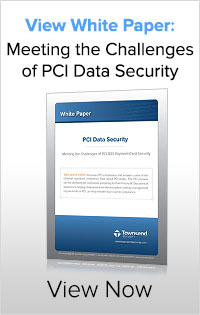What Standards for PCI Encryption You Need To Know and Why They Matter
Payment Card Industry - Data Security Standards (PCI-DSS) require you to encrypt credit card account numbers stored in your database and ensure data stays secure when transferred outside your company.

In order to understand these PCI encryption requirements, we first should know the source of industry best practices for encryption key management. Here in the US, the National Institute for Standards and Technology (NIST) is the most common source for guidance on best practices. The NIST special publication SP-800-57 provides specific pointers on how best practices for both procedurally managing encryption keys, and what to look for in key management systems. In these documents you will find the genesis of most standards regarding encryption key management, including the following concepts in PCI DSS 2.0 Section 3. Next, it is important to understand the security best practices concepts of Dual Control, Separation of Duties, and Split Knowledge. I’ll simplify them here from the point of view of encryption key management:
- Dual Control means that no one person alone should be able to manage your encryption keys. Creating, distributing, and defining access controls should require at least two individuals working together to accomplish the task.
- Separation of Duties means that different people should control different aspects of your data protection strategy. This is the old adage “don’t put your eggs in one basket”. The person who creates and manages the keys should not have access to the data they protect. And, the person with access to protected data, should not be able to manage encryption keys.
- Split Knowledge applies to the manual generation of encryption keys, or at any point where encryption keys are available in the clear. More than one person should be required to constitute or re-constitute a key in this situation.
In order to meet standards for PCI encryption, you need to make sure you protect these three things properly:
- Protect your data at rest with AES Encryption
Advanced Encryption Standard (AES) has been adopted as a format standard (FIPS -197) by the US government and many state and local agencies when it comes to encrypting data in a database. AES is the recommended encryption method for PCI-DSS, HIPAA/HITECH, GLBA/FFIEC and individual state privacy regulations. Encryption methods approved and certified by the National Institute of Standards and Technology (NIST) provide assurance that your data is secured to the highest standards.
- Protect your data in motion with PGP Encryption
PGP encryption is the standard when it comes to encrypting files that need to be transferred. Pretty Good Privacy (PGP) is the standard for encrypted file exchange among the world’s largest retail, finance, medical, industrial, and services companies. Also know that when encrypting a file with PGP, you may be using AES encryption. Transmit sensitive files over the internet using trusted encryption technologies. (AES, SSH, SSL, and PGP). Encryption solutions work together to ensure that all your sensitive data is secure even after the transmission is complete. AES will protect data at rest within your organization and PGP keeps it secure when it is sent outside your company.
- Protect your encryption keys and your data by keeping them apart!
Leaving your encrypted data and keys in the same place is like leaving the key to your house under your welcome mat. Security best practices require that you store encryption keys separately from your encrypted data and managed with an encryption key manager. It is also important to note that. In regards to the cloud, PCI SSC recently offered this guidance:
In a public cloud environment, one Customer’s data is typically stored with data belonging to multiple other Customers. This makes a public cloud an attractive target for attackers, as the potential gain may be greater than that to be attained from attacking a number of organizations individually. Strong data-level encryption should be enforced on all sensitive or potentially sensitive data stored in a public cloud. Because compromise of a Provider could result in unauthorized access to multiple data stores, it is recommended that cryptographic keys used to encrypt/decrypt sensitive data be stored and managed independently from the cloud service where the data is located.
Download the whitepaper Meet the Challenges of PCI Compliance and learn more about protecting sensitive data to meet PCI compliance requirements.
At Townsend Security, we ensure our customers data is secured to the highest level for compliance. Our AES encryption solutions are NIST validated and our encryption key management solutions are FIPS 140-2 certified. Our HSM appliances integrate seamlessly with Windows, Linux, UNIX, IBM Power Systems and Microsoft SQL Server 2008/2012 (enterprise edition) and can also work with earlier/non-enterprise editions of SQL Server.
As always, if you have comments or questions about PCI encryption, please list them here

